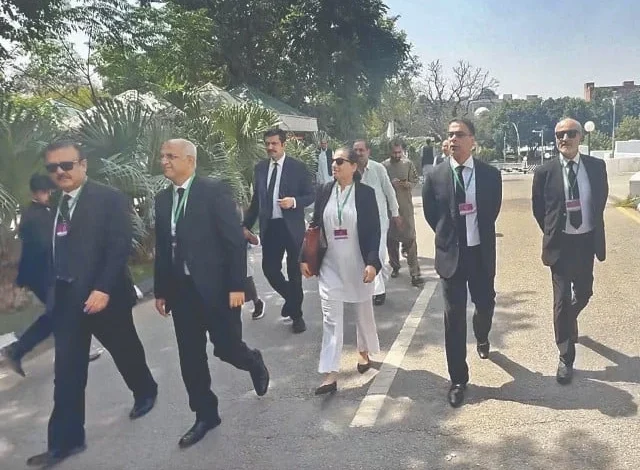Five IHC judges contest the SC’s CJ’s authority.

In a historic move, five judges from the Islamabad High Court (IHC) personally petitioned the Supreme Court on Friday, contesting various administrative actions imposed by IHC Chief Justice Sardar Muhammad Sarfraz Dogar.
The judges, who filed the petitions under Article 184(3) of the Constitution, were Mohsin Akhtar Kayani, Babar Sattar, Tariq Mehmood Jahangiri, Sardar Ejaz Ishaq Khan, and Saman Rafat Imtiaz. One of their eleven prayers was to have an IHC order prohibiting Justice Jahangiri from practicing law quashed.
A division bench made up of Chief Justice Dogar and Justice Muhammad Azam Khan prevented Justice Jahangiri from carrying out his duties on September 16 in response to a quo warranto plea alleging the judge had a questionable LLB degree. This action further widened the rift within the judiciary.
It’s interesting to note that the bench also asked Attorney General for Pakistan (AGP) Mansoor Awan for advice on whether the petition may be maintained.
Senior attorneys Ashtar Ali Ausaf and Barrister Zafarullah Khan were also named amici curiae. The bench stated that the judge could not hear cases until the Supreme Judicial Council (SJC), the body for judges’ accountability that has also been contacted over Justice Jahangiri, made a decision.
The IHC judges sought the Supreme Court to rule in their petitions that a high court judge can only be barred from carrying out judicial duties in accordance with Article 209 of the Constitution.
They argued that, in accordance with Article 209(7) read with Article 199(1) of the Constitution, a writ of quo warranto demanding the removal of a judge from office is not admissible.
In his petition, Justice Jahangiri claimed that the ruling on September 16 violated his Article 10-A fundamental rights. According to sources, the judge’s petition has been given diary number 23409, and he is free to present his argument in front of the highest court.
The petitioners also asked the highest court to rule that the chief justice is not permitted to form benches or transfer cases once a bench has been seized of the case, and that administrative powers cannot be used to subvert or supersede the judicial authority of high court judges.
It asked the court to rule that a high court’s chief justice cannot arbitrarily remove available judges from the roster or utilize the roster-issuing authority to remove justices from their positions as judges;
Additionally, it asked the Supreme Court to decide that bench formation, case transfers, and roster issuance can only be carried out in compliance with the guidelines established by the entire high court under Article 202, read with Article 192(1) of the Constitution.
“Declare that the doctrine of ‘Master of the Roster’ has been definitively set aside in the SC decisions, including in Raja Amer Khan v Federation of Pakistan and the decision-making with respect to constitution of benches, transfer of cases, or issuance of roster cannot solely rest in the hands of the CJ.”
Through notifications dated 03.02.2025 and 15.07.2025, the judges further asked the highest court to declare the creation of IHC management committees and all of its actions unlawful.
The petitions also asked the SC to rule that the administration committee’s adoption and approval of the IHC Practice and Procedure Rules, 2025, as well as its announcement without the IHC’s prior consent, violated Article 192(1) read with Article 202 of the Constitution.
“Direct the IHC to establish the Islamabad District Judiciary as a permanent institution, with members enjoying judicial independence and able to carry out their judicial duties without fear or favor, and to provide effective supervision and oversight over the functioning of the district judiciary, as required by the Constitution under Article 203 and section 6 of the IHC Act, 2010;
“Declare that the high court cannot issue a writ under Article 199 of the Constitution to itself and a division bench of the high court is neither vested with jurisdiction to sit in appeal over interlocutory orders of a single bench nor can assume control over the proceedings of a single bench as if it is an inferior court or tribunal,” the petitions stated.
In February of this year, the same judges from the IHC had resisted the transfer of three judges, including Justice Dogar, from other high courts to the IHC.
These judges went to the Supreme Court when Aamer Farooq, the chief justice of the IHC at the time, rejected their representation. On June 20, the SC’s constitutional bench (CB) denied their applications. The judges have yet to file an intra-court appeal against the CB’s order.
Six IHC justices, including all of the petitioner judges, accused an intelligence agency of interfering in court cases in a letter sent to the Supreme Judicial Council of Pakistan (SJCP) on March 26, 2024.
The letter detailed cases of judges being under pressure by having their family kidnapped, tortured, and having their homes surveilled in secret.
Speak with reporters
Justice Mohsin Akhtar Kayani responded to questions from a few Supreme Court journalists by stating that they arrived at the court after hearing the cases that were assigned to them at the lower court.
The senior puisne judge of the IHC stated, “Like any other Pakistani, we continue to believe in law and justice.” Later, the judges drove away from the Supreme Court together.
However, some cause lists were canceled on Friday due to the absence of five judges. The division bench made up of Justices Babar Sattar and Ejaz Ishaq Khan was unable to hear matters pertaining to taxes, and Justice Saman Rafat Imtiaz’s roster was eliminated. From September 16 to 19, Justices Arbab Muhammad Tahir and Khadam Hussain Soomro were already on leave.